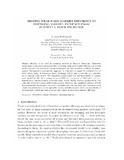| dc.contributor.author | Mollah, A.S. | |
| dc.date.accessioned | 2011-05-20T13:51:04Z | |
| dc.date.available | 2011-05-20T13:51:04Z | |
| dc.date.issued | 2007 | |
| dc.identifier.citation | Mollah, A.S. (2007) Testing weak-form market efficiency in emerging market: evidence from Botswana Stock Exchange, International Journal of Theoretical and Applied Finance, Vol. 10, No. 6, pp. 1077-1094 | en_US |
| dc.identifier.issn | 0218-4885 | |
| dc.identifier.uri | http://hdl.handle.net/10311/800 | |
| dc.description.abstract | Market effeciency is an area enormous interest in the financial literature. Numerous researches conducted imperical in testing weak-form market effeciency in several stock markets and employed various techniques but the empirical evidence in controversial. Triangulation econometric approach is employed to assess the predictability of daily return series of the Botswana Stock Exchange (BSE) and to test the null hyphothesis of random walk model. The empirical results reject the null hypothesis of random walk model for the daily return series of BSE for the period of 1989-2005 and evidenced serial autocorrelation of return series, which clearly indicate predictability and volatility of security prices of Botswana market. However the empirical evidence of both non-parametric and parametric test reject the hypothesis of random walk model and indeed violate the notion of weak-form market efficiency. | en_US |
| dc.language.iso | en | en_US |
| dc.publisher | World Scientific, www.worldscientific.com | en_US |
| dc.subject | week form market effeciency | en_US |
| dc.subject | emerging market | en_US |
| dc.title | Testing weak-form market effeciency in emerging market: evidence from Botswana Stock Exchange | en_US |
| dc.type | Published Article | en_US |

